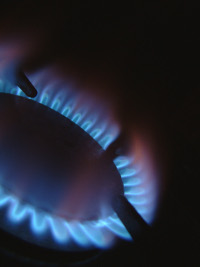How I cut our gas bill in half with one phone call
 Recently, we got a letter from our utility company.
Recently, we got a letter from our utility company.
As a result of your latest annual review, it said, your monthly payments will increase to by £5 to £70 a month. I gasped – £70 a month!?
I realise an increase by a fiver isn’t much in this day and age – but the original £65 was higher than it should have been (we’d underpaid when we first moved in so overpaid over the summer to make up for it). I’d been hoping for it to drop when everything levelled out, not raise further.
John and I were in disbelief about it. We didn’t think we used that much gas. Sure, it powers our heating, our hot water and our cooker hob, but the oven is electric and so is the shower. We mostly shower rather than have baths so don’t use much gas-heated hot water at all. Even though we work from home and have a high-ceilinged draughty house, we hardly over-use the central heating – we prefer to use our woodburning stoves for heat when we’re in the living room or office, and only used the central heating last year when we were in other parts of the house – with the thermostat at 15C/60F and only programmed to come on at certain times of day (and certainly never at night). We wear layers and use animals as hot water bottles.
We weren’t sure how much we could cut back – maybe rely on the stoves more (although we’d obviously need more wood than we’d planned for to do that), wear more layers, get more animals… John accepted that his nasty habit of turning on the hot tap to rinse things (but turning it off again before the hot water started) needed to stop and I worried how much energy we’d used cooking jams and long-time-on-the-hob stews, curries and pasta sauces. Even with my recent drop in income, we weren’t particularly concerned about the extra fiver – we wouldn’t have to be selling any kidneys to cover it – but we were worried about how much it was costing compared to how little we were using. What if we did need to start using the heating more? How much would it cost us then? And what’s the going rate for a one-careful-owner kidney these days?
Then I decided to do some maths. I collected together all the year’s bills and counted up how many units of gas we’d actually used. I also made sure that our bills were being worked out on actual meter readings and not estimates – they were. Then I made the phone call I mention in the title.
I explained the situation to the woman on the end of the phone. I explained that I was happy to accept that I’d done something wrong in my calculations but according to my figures, we should be paying substantially less than the £70 they’d proposed. With a bit of rounding up, I thought it should be closer to £40 a month.
She put me on hold and did the maths herself. Then she put me on hold again and got her manager to do the maths. They both worked out it should have been £32 a month. We settled on £35 a month to give us a bit of leeway in case it’s a cold winter and the dog doesn’t perform her feet heating task as well as desired.
She said she couldn’t understand where the £70 a month had come from – it just didn’t make any sense when you looked at the figures.
I suspect the power company don’t actually do any counting during the automated “annual review” process and just put everyone’s bill up a little bit – an amount not many people will notice – because every extra pound that our accounts are in credit will be money in their bank account making interest for them. Sure, that money is still technically mine and I’d be able to use it against future power purchasing, but I’d much rather it was earning interest for me, not them!
The episode has made me more keen than ever to get our paperwork in better order and to keep taking monthly meter readings for my own interest – if we suddenly start using more of something, it will be nicer to be able to spot it earlier rather than waiting for the quarter-and-then-some bills. I’m also definitely going to be checking all future bills incredibly carefully.
Read More


